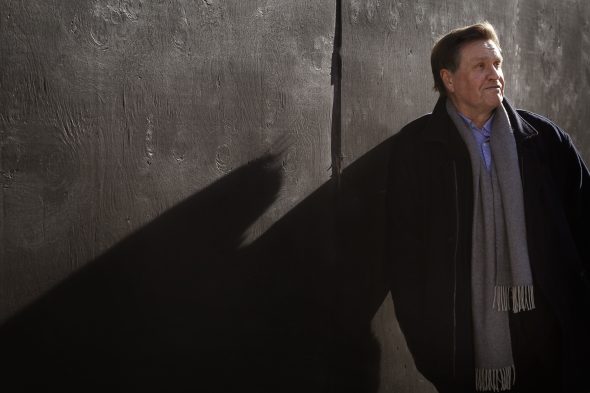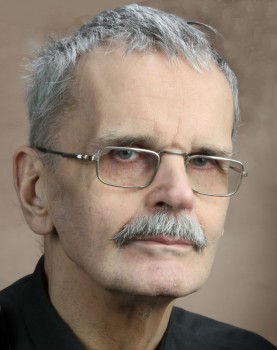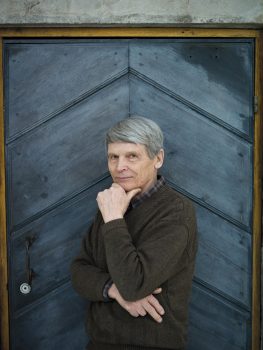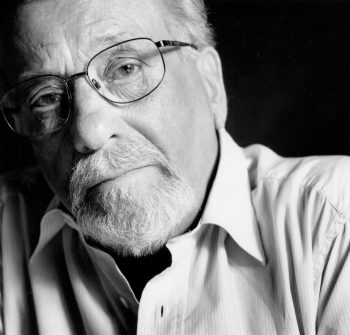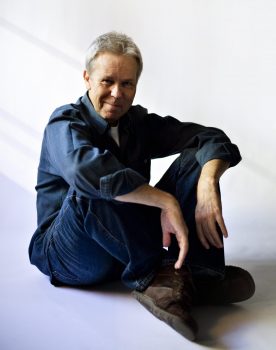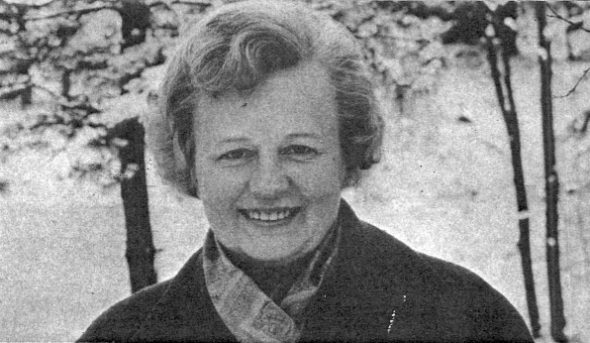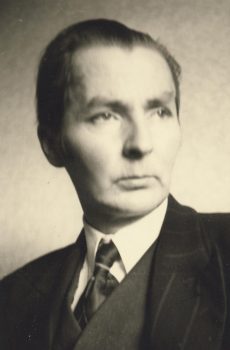Archives online
The starving, too
Issue 2/1983 | Archives online, Fiction, Prose
Poems from Det som alltid är (‘What always is’). Introduction by Sven Willner
The starving, too
The starving, too, can
love, but their love is
simplified to hunger, its
principle. With the help of
another’s love the sated love
themselves, which they
otherwise would hate. And
stronger is perhaps the love
that saves,
but deeper is the one that
seals. People, of
whom all that is left is
a heart and its
two arms, give one another
their hunger. More…
And he left the road
Issue 2/1983 | Archives online, Fiction, Prose
Three short stories from Maantieltä hän lähti (‘And he left the road’). Introduction by Eila Pennanen
And he left the road
And he left the road, walking straight ahead across fields and ditches, past barns and through bushes growing in the ditch. From the fields he went on to the forest, climbed a fence, walked past spruce and pine, juniper bushes and rocks, and came to the edge of a forest and to the swamp. He crossed the swamp, going through small groves of trees if they happened to be in his way. He went on walking rapidly across rivers, through forests, over seas and lakes, and through villages, and finally he came back to the very spot from which he had started walking straight ahead.
In the same way he walked at a right angle to the direction he had first taken and after that, a few times between those two directions. Every time he would start from the road and in the end would always come back to the road in the same direction as when he’d started off. On his rounds, after walking a bit, he would stop and look up every now and then, and each time he looked he would see the sky and sun or the moon and stars. More…
Poems
Issue 1/1983 | Archives online, Fiction, poetry
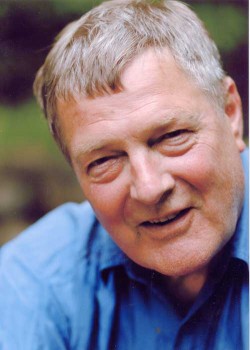
Claes Andersson. Photo: Johan Bargum.
Claes Andersson (born 1937) became, during the 1960s, one of the few authors to free themselves from the modernist tradition so firmly established in Finland-Swedish writing in the 1920s to create poetry of a more distinctly personal kind. Claes Andersson’s poems are coloured by his training as a psychiatrist; he uses technical language in which scientific terms are exploited as an expressive device. His work also sometimes contains black humour and an ironical element calculated to shock the reader; they reflect the contrast between the dream of beauty and love and the grim reality of evil . To date, Andersson has published eleven collections of poems and a considerable number of plays for the stage, cabaret and radio. He has also written three novels, the latest of which – entitled En människa som börjar likna sin själ (‘The person who began to resemble his soul’) – is to appear in the autumn of 1983. For an introduction to Claes Andersson’s work, see Thomas Warburton’s article in Books from Finland 3/1979. Claes Andersson’s poems have recently appeared in translation in Poetry East, Seneca Review, Scandinavian Review and Grand Street.
Loneliness
My love, the moments I spend
in your cunt I forget my
migraine aching joints drinking problem grand mal paralysis
hallucinations pain between the shoulderblades short-
ness of breath hiccoughs dandruff dry skin vertigo bedwetting
impaired hearing chafed lips pustules liver
spots leg sores bleeding gums flatulence
sciatica crying fits thoughts of suicide swol-
len ankles pathological thirst Angst baldness double
vision facial twinges difficulty concentrating
cross eyes burning in the urethra running ears ring
ing ears cramps throat pain itching allergies
strange subcutaneous lumps cold hands nail-
biting hoarseness obesity jealousy vomiting
constipation sleeplessness noctural crying fits
failing memory pus in each nasal sinus and gout.
From Rumskamrater (‘Roommates’), 1974)
Chronicles of crisis
Issue 4/1982 | Archives online, Fiction, Prose
Books from Finland presents here an extract from Dyre prins, a novel by the Finland-Swedish writer Christer Kihlman that is to be published in 1983 by Peter Owen of London under the title Sweet Prince, in a translation by Joan Tate.
Christer Kihlman (born 1930) first became known as a poet; but, after publishing two collections of poetry, he turned to novels. He has been branded a merciless scourge of the bourgeoisie. Equally important in his writing, however, are his masterly psychological analyses, his examination of the myriad aspects of the human personality, his sovereign disregard for taboos and his unflagging search for the truth. His books are about crises – the conflict between the generations, between the individual and society, between opposing political ideologies, between homosexual and heterosexual love. As Ingmar Svedberg remarked in an extensive appreciation of Kihlman’s work that appeared in Books from Finland 1-2/1976, ‘In his perceptive moral analyses, his exploration of the depths of human destructiveness and degradation, Kihlman is sometimes reminiscent of Faulkner.’ Since 1970, Kihlman has published three revealing autobiographical works, two of them dealing with his encounter with South America; Dyre prins, first published in 1975, represents a brief interlude of fiction.
The extract printed below is accompanied with a personal appreciation of the novel by its English translator, Joan Tate
Grandfather’s astonishing revelation gave me a new perspective on my life. I had suddenly been given a concrete, genuine foundation for both my hatred and my self-esteem. In a way I took the story of my origins as an extreme confirmation of the rightness of the Communist interpretation of reality, and at the same time it gave me a wonderful, dazzling sensation of being someone, despite everything, of having a place in a meaningful human perspective of time, despite everything, of being a link, however modest, in the historical family tradition. I did not need to found a dynasty; I already belonged to a dynasty, if only a minor branch. One was less important than the other, and even if the two experiences were irreconcilable and contradictory, they existed all the same in the same consciousness, contained within the same consciousness, my consciousness. I, Donald Blad! More…
The Storm • September
Issue 3/1982 | Archives online, Fiction, Prose
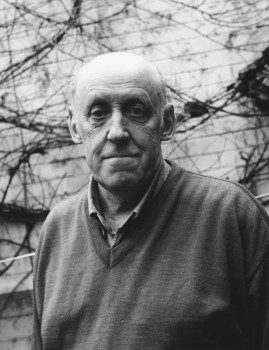
Bo Carpelan. Photo: Charlotta Boucht
Extracts from Jag minns att jag drömde (‘I remember dreaming’, 1979)
The Storm
I remember dreaming about the great storm which one October evening over forty years ago shook our old schoolhouse by the park. My dream is filled with racing clouds and plaintive cries, of roaring echoes and strange meetings, a witch’s brew still bubbling and hissing in the memory of those great yellow clouds.
Our maths teacher – a small sinewy woman who seemed to have swallowed a question mark and was always wondering where the dot had gone, so she directed us in a low voice and with downcast eyes as if we didn’t exist – and yet her little black eyes saw everything that happened in the class, and weasel-like, were there if anyone disobeyed her – was writing the seven times table on the blackboard, when a peculiar light filled our classroom. We looked across at the window; the whole schoolhouse seemed to have been suddenly transformed into a railway station, shaking and trembling, a whistling sound penetrating the cold thick stone walls, and at raging speed, streaky clouds of smoke were sliding past the window, hurtling our classroom forward as if we were in an aeroplane. Our teacher stopped writing and raised her narrow dark head. Without a word, she went over to the window and stood looking out at the racing clouds. More…
Writer in demand
Issue 3/1982 | Archives online, Fiction, poetry
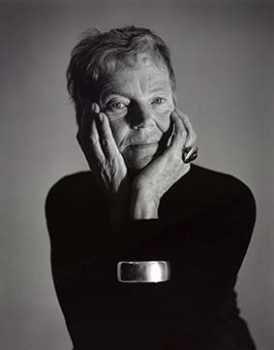
Märta Tikkanen. Photo: Stefan Bremer
Poems from Århundradets kärlekssaga (The Love Story of the Century)
Märta Tikkanen (born 1935), a Finland-Swedish journalist, teacher and mother of four children, made her literary debut with the novel Nu imorron (‘Now tomorrow’) in 1970. It is a story of the liberation of one woman who breaks free from her traditional role. Her next novels, Ingenmansland (‘No man’s land’, 1972) and Vem bryr sej om Doris Mihailov (‘Who cares about Doris Mihailov’, 1974) brought her fame in Scandinavia, but it was not until her fourth novel, Män kan inte våldtas (Manrape, translated by Alison Weir, Virago, 1978) appeared in 1975 that she made her international breakthrough. To date the book has been translated into eight languages and a film adaptation has been made by Jörn Donner.
Her next work, a cycle of poems called Århundradets kärlekssaga (The Love Story of the Century, 1978) became very popular: it has been translated into seven languages as well as adapted for radio, television and the stage . In 1979 she was awarded the Nordic Women’s Alternative Literature Prize. Die Liebesgeschichte des Jahrhunderts, a monologue play based on Verena Reichel’s translation (Rohwolt Taschenbuch Verlag, 1981) is presently being staged in some twenty theatres in West Germany, Austria and Switzerland. Recently Der Spiegel devoted a page to her career. The American première, directed by Margaret Booker, will take place in Intiman Theatre, Seattle. More…
Arska
Issue 3/1982 | Archives online, Fiction, Prose
A short story from Kaksin (‘Two together’). Introduction by Pekka Tarkka
A landlady is a landlady, and cannot be expected – particularly if she is a widow and by now a rather battered one – to possess an inexhaustible supply of human kindness. Thus when Irja’s landlady went to the little room behind the kitchen at nine o’clock on a warm September morning, and found her tenant still asleep under a mound of bedclothes, she uttered a groan of exasperation.
“What you do here this hour of day?” she asked, in a despairing tone. “You don’t going to work?”
Irja heaved and clawed at the blankets until at last her head emerged from under them.
“No,” she replied, after the landlady had repeated the question.
“You gone and left your job again?”
“Yep.” More…
About calendars and other documents
Issue 2/1982 | Archives online, Fiction, Prose
An extract from Sudenkorento (‘The dragonfly’, 1970). Introduction by Aarne Kinnunen
I now have. Right here in front of me. To be interviewed. Insulin artist. Caleb Buttocks. I have heard. About his decision. To grasp his nearly. Nonexistent hair and. Lift. Himself and. At the same time. His horse. Out of the swamp into which. He. Claims. He has sunk so deep that. Only. His nose is showing. How is it now, toe dancer Caleb Buttocks. Are you. Perhaps. Or is It your intention. To explain. The self in the world or. The world. In the self. Or is It now that. Just when you. Finally have agreed to. Be interviewed by yourself. You have decided. To go. To the bar for a beer?
– Yes. Can you spare a ten?
– Yes.
– Thanks. See, what’s really happened is that. My hands have started shaking. But when I down two or three bottles of beer, that corpse-washing water as I’ve heard them call it, my hands stop shaking and I don’t make so many typing errors. If I put away six or seven they stop shaking even more and the typing mistakes turn really strange. They become like dreams: all of a sudden you notice you’ve struck it just right. Let’s say, ‘arty’ becomes ‘farty’. Or I mean to say, ‘it strikes me to the core’ I end up typing ‘score’. It’s like that. A friend of mine, an artist, once stuck a revolver in my hand. Imagine, a revolver! I’ve never shot anything with any kind of weapon except a puppy once with a miniature rifle. My God, how nicely it wagged its tail when I aimed at it, but what I’m talking about are handguns, those shiny black steelblue clumps people worship as heaven knows what symbols. It’s not as if I haven’t been hoping to all my life. And now, finally, after I’d waited over fifty years, it turned out that the revolver was a star Nagant, just the kind I’d always dreamed of. So if I ever got one of those, oh, then would sleep through the lulls between shots with that black steel clump ready under my pillow. Well, my friend the artist set out one vodka bottle with a white label and three brown beer bottles with gold labels on the edge of a potato pit – we had just emptied all of them together – stuck the fully loaded star Nagant into my hand, took me thirty yards away and said:
– Oh, Lord. More…

